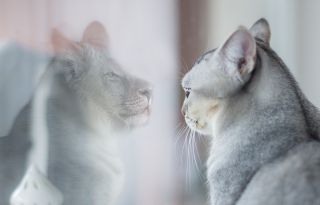Career
Do Prettier People Get More Job Offers?
Research suggests good looks promote career success, but there are liabilities.
Updated June 18, 2023 Reviewed by Gary Drevitch
Key points
- Attractiveness is positively related to employment opportunity, wages, and performance evaluations.
- A penalty based on same-sex bias occurs when pretty people are judged more harshly by those of similar gender.
- Attractive individuals may become oblivious to their own flaws, leading to narcissistic perceptions by others.

Look in the mirror and who do you see? In all likelihood, a competent, sincere individual, who is willing to exert effort to meet personal and professional goals. However, do others see you the same way? While we often tend to embellish our self-impressions and often misconstrue our abilities (Kruger & Dunning, 1999), humans across cultures are generally good at assessing what constitutes beauty. One alarming reality is that many employment and business decisions are made based on appearance, in stark contrast to the goals of diversity, equity, and inclusion (DEI) initiatives in many organizations where employees and leaders must be DEI certified before assuming any leadership role.
Numerous studies suggest that attractive individuals have employment advantages including landing better jobs, earning higher pay, and receiving more favorable performance evaluations than less-attractive peers. It is also important to acknowledge that attractive individuals may experience a "pretty penalty," whereby attractive people garner harsher criticism and negative biases when they fail to meet expectations (Wilson & Eckel, 2006). Additionally, the subtle effects of feeling attractive have personal and perceptive drawbacks such as increased confidence and perceived power, which can result in others believing that attractive individuals are more prone to narcissism.
Beautification Benefits
It is no secret that physical attractiveness can positively influence the way people are judged. Studies have shown that attractive individuals are often perceived as more competent, sociable, and trustworthy, leading to an increased likelihood of landing job offers (Hosoda et al., 2003). Employers may unconsciously associate attractiveness with other desirable traits, leading them to prefer attractive candidates over others.
Attractive individuals also enjoy financial benefits. Numerous studies have found a positive correlation between physical attractiveness and income levels (Judge et al., 2009). Employers, consciously or unconsciously, reward attractive employees with higher salaries, promotions, and better benefits. This phenomenon, often referred to as the "beauty premium," highlights the economic advantages attractive individuals may experience in the job market.
Attractive individuals may receive better performance ratings due to "the halo effect," a cognitive bias in which positive impressions based on one trait (in this case, physical attractiveness) influence overall perceptions. Colleagues and managers may overlook minor shortcomings or attribute them to external factors, providing attractive individuals with a more favorable evaluation. This bias can lead to increased opportunities for growth and advancement in the workplace, sometimes at the expense of less-attractive people who make greater or equal contributions to organizational success.
The Pretty Penalty
While physical attractiveness offers certain advantages, there is a flip side when attractive individuals fail to meet the high expectations associated with their looks. Sometimes, they may face harsher criticism and negative repercussions. This penalty stems from the belief that attractive individuals have an obligation to maintain their appearance and perform exceptionally in all areas of life. Failing to do so can result in heightened scrutiny and disapproval from those in a position to evaluate a pretty face.
Attractive individuals may face even more scrutiny from individuals of the same sex. Studies reveal that both men and women tend to evaluate attractive individuals of their own gender more harshly (Paustian-Underdahl, et al., 2016). This critical behavior may stem from feelings of competition or envy, leading to less favorable treatment of attractive peers. Consequently, attractive individuals may experience hurdles in building positive relationships within their own gender. Consider that the “penalty” phenomenon becomes even more contentious as the world becomes increasingly diversified based on cultural change and gender fluidity.
Beware of Blind Spots
Attractive individuals have advantages, but their physical prowess may be responsible for inflated self-perceptions of confidence, extraversion, and socialization ability. Ego inflation, combined with an attractive appearance, may have subtle psychological effects that impact how they conduct themselves at work. Perceived physical attractiveness can promote a sense of power, suggesting to an individual that they should command attention and be able to influence others. However, this sense of power can also lead to limited self-awareness, as attractive individuals may become oblivious to their own flaws and shortcomings (Tu et al., 2022).
While not all attractive individuals are narcissistic, some studies suggest a link between physical attractiveness and narcissistic personality traits. The constant positive reinforcement received from society due to their appearance can lead to inflated self-esteem and an excessive focus on personal image. This potential downside of being attractive should be acknowledged, as narcissism can negatively impact interpersonal relationships and hinder professional growth.
In summary, physical attractiveness undeniably plays a role in employment, providing individuals with certain advantages such as increased job opportunities, higher pay, and better evaluations. However, we must also recognize the potential drawbacks, including harsher criticism, same-sex negative bias, limited self-awareness, and the risk of developing narcissistic traits. By considering these findings in the aggregate, we can work toward creating a more equitable and merit-based approach to hiring and evaluating individuals, placing more emphasis on skills, qualifications, and character rather than superficial factors like physical appearance. In turn, a more objective focus on what we perceive as valuable supports the critical agenda of creating a more just, equitable, and inclusive world.
References
Hosoda, M., Stone‐Romero, E. F., & Coats, G. (2003). The effects of physical attractiveness on job‐related outcomes: A meta‐analysis of experimental studies. Personnel Psychology, 56(2), 431-462.
Judge, T. A., Hurst, C., & Simon, L. S. (2009).Does it pay to be smart, attractive, or confident (or all three)? Relationships among general mental ability, physical attractiveness, core self-evaluations, and income. Journal of Applied Psychology, 94(3), 742–755.
Kruger, J., & Dunning, D. (1999). Unskilled and unaware of it: How difficulties in recognizing one’s own incompetence lead to inflated self-assessment. Journal of Personality and Social Psychology, 77, 1121–1134.
Paustian-Underdahl, S. C., & Walker, L. S. (2016). Revisiting the beauty is beastly effect: examining when and why sex and attractiveness impact hiring judgments. The International Journal of Human Resource Management, 27(10), 1034–1058.
Tu, M. H., Gilbert, E. K., & Bono, J. E. (2022). Is beauty more than skin deep? Attractiveness, power, and nonverbal presence in evaluations of hirability. Personnel Psychology, 75(1), 119-146.
Voit, M., Weiß, M., & Hewig, J. (2021). The benefits of beauty–Individual differences in the pro-attractiveness bias in social decision making. Current Psychology, 1-15.
Wilson, R. K., & Eckel, C. C. (2006). Judging a book by its cover: Beauty and expectations in the trust game. Political Research Quarterly, 59(2), 189–202.




